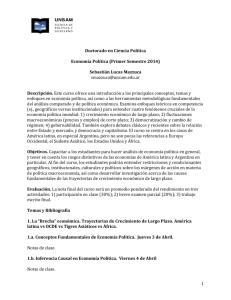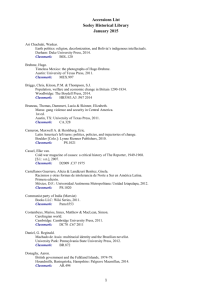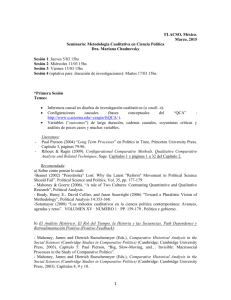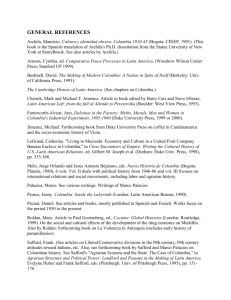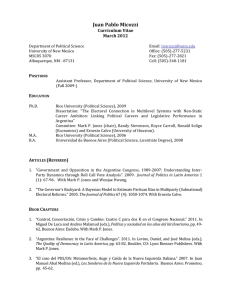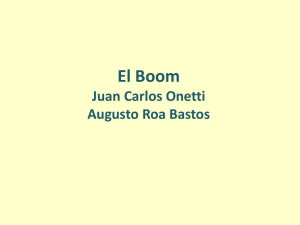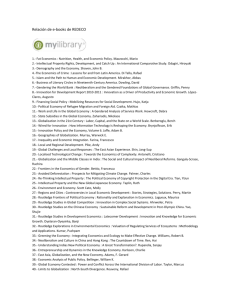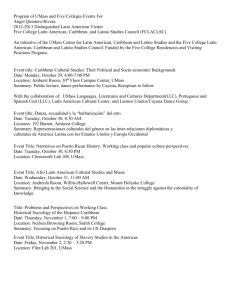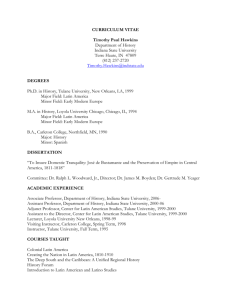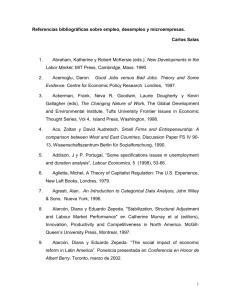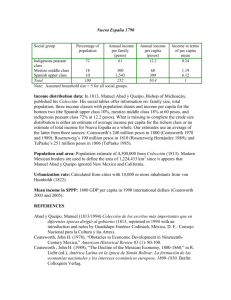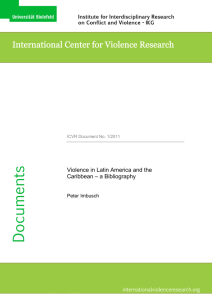AÑO ACADÉMICO : 200
advertisement
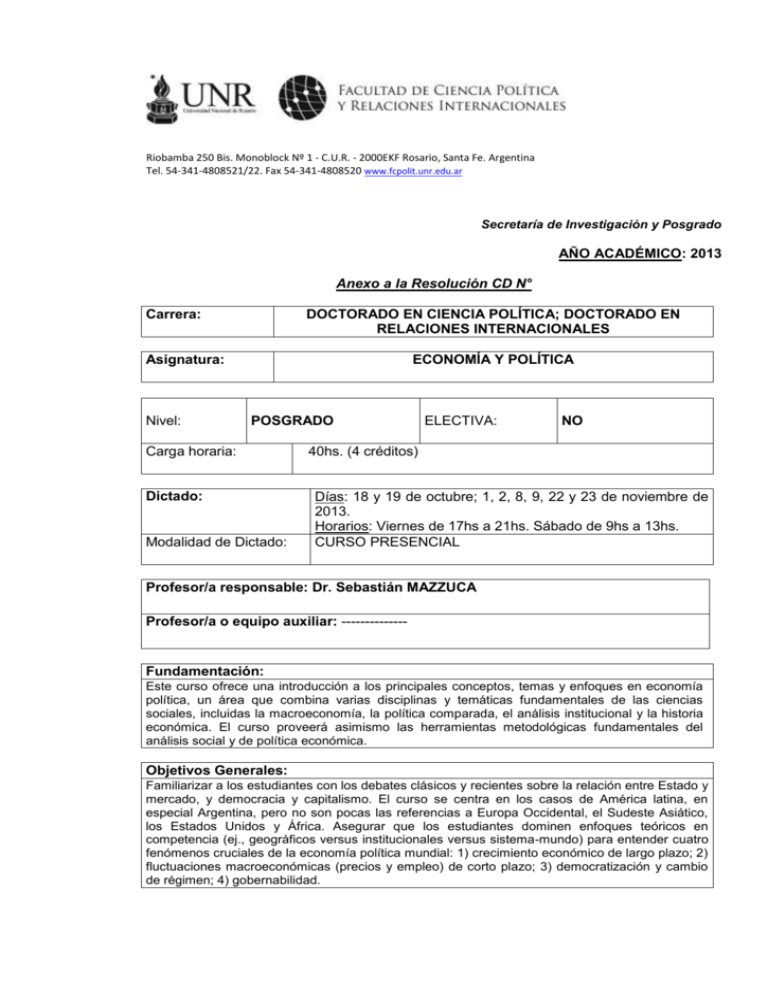
Riobamba 250 Bis. Monoblock Nº 1 - C.U.R. - 2000EKF Rosario, Santa Fe. Argentina Tel. 54-341-4808521/22. Fax 54-341-4808520 www.fcpolit.unr.edu.ar Secretaría de Investigación y Posgrado AÑO ACADÉMICO: 2013 Anexo a la Resolución CD N° Carrera: DOCTORADO EN CIENCIA POLÍTICA; DOCTORADO EN RELACIONES INTERNACIONALES Asignatura: Nivel: ECONOMÍA Y POLÍTICA POSGRADO Carga horaria: Dictado: Modalidad de Dictado: ELECTIVA: NO 40hs. (4 créditos) Días: 18 y 19 de octubre; 1, 2, 8, 9, 22 y 23 de noviembre de 2013. Horarios: Viernes de 17hs a 21hs. Sábado de 9hs a 13hs. CURSO PRESENCIAL Profesor/a responsable: Dr. Sebastián MAZZUCA Profesor/a o equipo auxiliar: -------------- Fundamentación: Este curso ofrece una introducción a los principales conceptos, temas y enfoques en economía política, un área que combina varias disciplinas y temáticas fundamentales de las ciencias sociales, incluidas la macroeconomía, la política comparada, el análisis institucional y la historia económica. El curso proveerá asimismo las herramientas metodológicas fundamentales del análisis social y de política económica. Objetivos Generales: Familiarizar a los estudiantes con los debates clásicos y recientes sobre la relación entre Estado y mercado, y democracia y capitalismo. El curso se centra en los casos de América latina, en especial Argentina, pero no son pocas las referencias a Europa Occidental, el Sudeste Asiático, los Estados Unidos y África. Asegurar que los estudiantes dominen enfoques teóricos en competencia (ej., geográficos versus institucionales versus sistema-mundo) para entender cuatro fenómenos cruciales de la economía política mundial: 1) crecimiento económico de largo plazo; 2) fluctuaciones macroeconómicas (precios y empleo) de corto plazo; 3) democratización y cambio de régimen; 4) gobernabilidad. Riobamba 250 Bis. Monoblock Nº 1 - C.U.R. - 2000EKF Rosario, Santa Fe. Argentina Tel. 54-341-4808521/22. Fax 54-341-4808520 www.fcpolit.unr.edu.ar Secretaría de Investigación y Posgrado Objetivos Específicos: Capacitar a los estudiantes para hacer análisis social y de economía política en general, y tener en cuenta los rasgos distintivos de las economías de América latina y Argentina en particular. Al fin del curso, los estudiantes podrán entender restricciones y condicionantes geográficos, institucionales, culturales y políticos sobre los márgenes de acción en materia de política macroeconomía, así como desarrollar investigación acerca de las causas fundamentales de las trayectorias de crecimiento económico de largo plazo. CONTENIDOS Y BIBLIOGRAFIA: UNIDAD 1: CONTENIDOS: La “Brecha” económica. Trayectorias de Crecimiento de Largo Plazo. América latina vs OCDE vs Tigres Asiáticos vs África. 1.a. Conceptos Fundamentales de Economía Política. 1.b. Inferencia Causal en Ciencias Sociales. 1.c. Hechos Estilizados de la Economía Política. Trayectorias de Crecimiento de Largo Plazo. BIBLIOGRAFIA BASICA U OBLIGATORIA: Office of the Chief Economist for LAC World Bank, Latin America and the Caribbean’s Long Term Growth: Made in China?, Semi-Annual Report, World Bank, Washington DC, September 2011. Thomas Skidmore, Peter Smith and James Green, “Strategies of Economic Development,” Modern Latin America, New York, OUP, 2010: 351-375. Kenneth L. Sokoloff and Stanley L. Engerman, “History Lessons: Institutions, Factor Endowments, and Paths of Development in the New World,” The Journal of Economic Perspectives, 14, 3, Summer 2000: 217-232. http://www.jstor.org/stable/2646928 John H. Coatsworth, “Structures, Endowments, and Institutions in the Economic History of Latin America,” Latin American Research Review, 40, 3, 2005: 126-144. Daron Acemoglu, Simon Johnson and James A. Robinson, “Reversal of Fortune: Geography and Institutions in the Making of the Modern World Income Distribution,” The Quarterly Journal of Economics, Vol. 117, No. 4 (Nov., 2002), pp. 1231-1294 Paul Collier and Jan Willem Gunning, “Why Has Africa Grown So Slowly?” The Journal of Economic Perspectives, Vol. 13, No. 3 (Summer, 1999), pp. 3-22 David E. Bloom, Jeffrey D. Sachs, Paul Collier and Christopher Udry, “Geography, Demography and Economic Growth in Africa,” Brookings Papers on Economic Activity, Vol. 1998, No. 2 (1998), pp. 207-295 UNIDAD 2: CONTENIDOS: Visiones del Crecimiento Económico. Crecimiento de América latina. Casos y períodos. 2.a. Enfoques I. Visiones Liberales, Institucionales y Culturales. 2.b. Enfoques II: Marxismo, Dependencia. 2.c. Crecimiento Económico Latinoamericano: Casos y Periodos. BIBLIOGRAFIA BASICA U OBLIGATORIA: Riobamba 250 Bis. Monoblock Nº 1 - C.U.R. - 2000EKF Rosario, Santa Fe. Argentina Tel. 54-341-4808521/22. Fax 54-341-4808520 www.fcpolit.unr.edu.ar Secretaría de Investigación y Posgrado Daron Acemoglu, Simon Johnson and James A. Robinson, “Institutions as a Fundamental Cause of Long-Run Growth,” Handbook of Economic Growth, 2002: 386-472. Przeworski, Adam (2004) “Institutions Matter?” Government and Opposition, vol.39, no.4, pp. 527540. W.W. Rostow, “The Stages of Economic Growth,” in Naazneen Barma and Steven Vogel (eds.), The Political Economy Reader: Markets as Institutions, (New York: Routledge, 2008), pp. 199-209. Milton and Rose Friedman, Free to Choose: A Personal Statement, (Chicago: University of Chicago Press, 1990), Introduction, ch's 1, 2, 3, and 8. J.G. Ruggie, “International Regimes, Transactions, and Change: Embedded Liberalism in the Postwar Economic Order,” International Organization, Vol. 36, No. 2, Spring 1982, pp. 379-415. Mancur Olson, The Logic of Collective Action: Public Goods and the Theory of Groups, (Cambridge, MA: Harvard University Press, 1971), ch's 1-4. Max Weber, The Protestant Ethic and the Spirit of Capitalism, (New York: Oxford University Press, 2011), first published in 1904-05. Karl Polanyi, The Great Transformation: The Political and Economic Origins of Our Time, (Boston: Beacon Press, 2001), first published in 1944, ch's 3-14. Karl Marx, Capital, Sections in Part II of Robert Tucker (ed.), The Marx-Engels Reader, (New York: W.W. Norton, 1978), first published in 1867. Karl Marx, "Preface to A Contribution to the Critique of Political Economy" and "Manifesto of the Communist Party" in Tucker reader. Alexander Gerschenkron, “Economic Backwardness in Historical Perspective,” in Idem., Economic Backwardness in Historical Perspective, (Boston, MA: Harvard University Press, 1962), pp. 5-30. Fernando H Cardoso y Enzo Faletto, Dependency and Development in Latin America, Berkeley, University of California Press, 1979. Andre Gunder Frank, “The Development of Underdevelopment,” in Robert Rhodes (ed.), Imperialism and Underdevelopment, (New York: Monthly Review Press, 1970), pp. 4-17. Kiren Chaudhry, “The Myths of the Market and the Common History of Late Developers,” in Naazneen Barma and Steven Vogel (eds.), The Political Economy Reader: Markets as Institutions, (New York: Routledge, 2008), pp. 447-473. Matthew Lange, James Mahoney, and Matthias vom Hau, “Colonialism and Development: A Comparative Analysis of Spanish and British Colonies, American Journal of Sociology, 111, 5 March 2006: 1412-62. (conectar con “Reversal of Fortune” de la Semana 1). Douglass C. North, William Summerhill, and Barry R. Weingast, “Order, Disorder and Economic Change: Latin America vs. North America,” in Bruce Bueno de Mesquita (ed.), Governing for Prosperity, Yale University Press, 2009. Robert H. Bates, John H. Coatsworth and Jeffrey G. Williamson, “Lost Decades: Post Independence Performance in Latin America and Africa,” The Journal of Economic History, Vol. 67, No. 4 (Dec., 2007), pp. 917-940. William Glade, “Latin America and the International Economy, 1870–1914,” in Leslie Bethell (ed.), Latin America since 1930: Economy, Society and Politics, Cambridge University Press, 1986. Cambridge Histories Online. Nataniel H. Leff, “Economic Development in Brazil, 1822-1913,” in in Stephen Haber (ed.), How Latin America Fell Behind, California, Stanford University Press, 1997: 34-64. Manuel Moreno Franginals, “Plantation Economies and Societies in the Spanish Caribbean, 1860– 1930,” in Leslie Bethell (ed.), Latin America since 1930: Economy, Society and Politics, Cambridge University Press, 1986. Cambridge Histories Online. Albert O. Hirschman, “The Political Economy of Import-Substituting Industrialization in Latin America,” The Quarterly Journal of Economics, 82, 1, Feb. 1968: 1-32. http://www.jstor.org/stable/1882243 Riobamba 250 Bis. Monoblock Nº 1 - C.U.R. - 2000EKF Rosario, Santa Fe. Argentina Tel. 54-341-4808521/22. Fax 54-341-4808520 www.fcpolit.unr.edu.ar Secretaría de Investigación y Posgrado Gary Gereffi, and Peter Evans, “Transnational Corporations, Dependent Development, and State Policy in the Semiperiphery: A Comparison of Brazil and Mexico,” Latin American Research Review 16, 3, 1986: 31-64. http://www.jstor.org/stable/2502914 Peter Evans, “Class, State, and Dependence in East Asia: Lessons from Latin America,” in Frederic Deyo (ed.), The Political Economy of the new Asian Industrialism, Cornell University Press, 1987. UNIDAD 3: CONTENIDOS: 3. Estado y Crecimiento. Variedades de Capitalismo. Variedades de Intervenciones Estatales. 3.a. Variedades de Capitalismo (Avanzado). 3.b. Variedades de Estados y Capitalismos en el Sur Global. 3.c. La Economía Contemporánea de América Latina y Argentina. BIBLIOGRAFIA BASICA U OBLIGATORIA: Robert Solow, "The New Industrial State, or Son of Affluence," and reply by John Kenneth Galbraith, Public Interest, #9, Fall 1967. Peter Hall and David Soskice, eds, Varieties of Capitalism, 2001, pp. 1-68. Wolfgang Streeck, “E Pluribus Unum? Varieties and Commonalities of Capitalism,” Max Plank Institute for the Study of Societies Discussion Paper, 10/2012. Robert Wade, Governing the Market, Princeton, NJ: Princeton University Press, 1990. Paul Pierson, “When Effect Becomes Cause. Policy Feedback and Political Change,” World Politics, Vol. 45, No. 4 (Jul., 1993), pp. 595-628. Adam Przeworski and Michael Wallerstein, “Structural Dependence of State on Capital,” The American Political Science Review, Vol. 82, No. 1 (Mar., 1988), pp. 11-29 Peter Smith, “The Rise and Fall of the Developmental State,” in Menno Vellinga (ed.), The Changing Role of the State in Latin America, Boulder, CO: Westview Press, 1998. Atul Kohli, “The Political Economy of Development Strategies: Comparative Perspectives on the Role of the State,” Comparative Politics, Vol. 19, No. 2 (Jan., 1987), pp. 233-246. Robert Wade, “States and Development: The Long View in Time and Space,” Contemporary Sociology, Vol. 36, No. 4 (Jul., 2007), pp. 309-313. Peter Evans and James E. Rauch, “Bureaucracy and Growth: A Cross-National Analysis of the Effects of “Weberian” Structures on Economic Growth,” American Sociological Review, Vol. 64, No. 5 (Oct., 1999), pp. 748-765. Riobamba 250 Bis. Monoblock Nº 1 - C.U.R. - 2000EKF Rosario, Santa Fe. Argentina Tel. 54-341-4808521/22. Fax 54-341-4808520 www.fcpolit.unr.edu.ar Secretaría de Investigación y Posgrado Peter Evans, “El Estado como Problema y como Solucion,” Desarrollo Económico, Vol. 35, No. 140, 35th Anniversary Issue (Jan. - Mar., 1996), pp. 529-562. Peter Evans, “Predatory, Developmental, and Other Apparatuses: A Comparative Political Economy Perspective on the Third World State,” Sociological Forum, Vol. 4, No. 4, Special Issue: Comparative National Development: Theory and Facts for the 1990s (Dec., 1989), pp. 561-587. Robert Bates, Markets and States in Tropical Africa, Berkeley, University of California Press, 1981. Ben Ross Schneider, “Hierarchical Market Economies and Varieties of Capitalism in Latin America,” Journal of Latin American Studies, 41: 553–575 Tim Padget, “Chile and Haiti: A Tale of Two Earthquakes,” Times. March 01, 2010. http://www.time.com/time/world/article/0,8599,1968576,00.html Guillermo O’Donnell, “On the State, Democratization and some Conceptual Problems: A Latin American view with glances at some postcommunist countries,” World Development, 21, 8, August 1993: 1355-1369. Fernando H. Cardoso, “New Paths: Globalization in Historical Perspective,” Studies in Comparative International Development, 2009, 44, 296–317 Emily Sinnott, John Nash, Augusto de la Torre, Natural Resources in Latin America and the Caribbean. Beyond Boom and Busts?, Washington DC, The World Bank, 2010. Kevin Gallagher and Roberto Porzecanski, “China Matters: China's Economic Impact in Latin America,” Latin American Research Review, 43, 1, 2008: 185-200. Mauricio Cárdenas and Adriana Kugler, “The Reversal of the Structural Transformation in Latin America After China’s Emergence,” Working Paper Brookings Institution, 2011. “The New Brazil” (Special Report), Financial Times, June 29, 2010. Luiz Carlos Bresser-Pereira, “From Old to New Developmentalism in Latin America,” in José Antonio Ocampo and Jaime Ros (eds.), The Oxford Handbook of Latin America Economics, Oxford University Press, 2009. José María Fanelli, Argentina y el desarrollo económico en el siglo XXI ¿Cómo pensarlo? ¿Qué tenemos? ¿Qué necesitamos?, Buenos Aires, Siglo XXI Editores, 2012. UNIDAD 4: CONTENIDOS: 4. Democracia y Capitalismo. Teorías y casos. 4.a. Capitalismo y Democracia en Países Avanzados. 4.b. Regímenes y Desarrollo. Hechos estilizados y teoría. Viernes 12 de julio. 4.c. Economía y Regímenes en América latina y África. Sábado 13 de Julio. BIBLIOGRAFIA BASICA U OBLIGATORIA: Riobamba 250 Bis. Monoblock Nº 1 - C.U.R. - 2000EKF Rosario, Santa Fe. Argentina Tel. 54-341-4808521/22. Fax 54-341-4808520 www.fcpolit.unr.edu.ar Secretaría de Investigación y Posgrado Dunning, Thad. 2008. Crude Democracy. NY. Cambridge University Press: Chapters 1-3. Karl, Terry. 1999. “The Perils of the Petro-State.” Journal of International Affairs. 53, 1: 31-48. Karl, Terry. 2007. “Oil-Led Development: Social, Political, and Economic Consequences.” Encyclopedia of Energy. Elsevier Inc.: 661-672. Hochschild, Adam. 2010. “Blood and Treasure.” Mother Jones. March/April Issue. http://motherjones.com/politics/2010/02/congo-gold-adam-hochschild Guillermo O’Donnell, “Estado y Alianzas,” en Guillermo O’Donnell, Contrapuntos, Buenos Aires, Paidos, 1998. Collier, David. 1978. “Industrial Modernization and Political Change: A Latin American Perspective,” World Politics 30, 4: 593-614. http://www.jstor.org.ezp-prod1.hul.harvard.edu/stable/pdfplus/2009988.pdf Sebastian Mazzuca, “The Rise of Rentier Populism in South America,” Journal of Democracy, April 2013, pp. 108-122. Neal Richardson, “Export-Oriented Populism: Commodities and Coalitions in Argentina,” Studies in Comparative International Development, 2009, 44, pp. 228-255 Scott Mainwaring, “The Crisis of Representation in the Andes,” Journal of Democracy, 17, 3, July 2006: 13-27. http://muse.jhu.edu/journals/jod/summary/v017/17.3mainwaring.html Jorge G. Castañeda, “Latin America's Left Turn,” Foreign Affairs, 85, 3, May-Jun 2006: 28-43. http://www.jstor.org/stable/20031965 T. H. Marshall, "Citizenship and Social Class," in Christopher Pierson and Francis Castles (eds.), The Welfare State: A Reader, (Cambridge: Polity Press, 2000), pp. 32-41. Dani Rodrik, "Why Do More Open Economies Have Bigger Governments?" Journal of Political Economy, Vol. 106, No. 5, October 1998, pp. 997- 1032. James O'Connor, "The Fiscal Crisis of the State," in Pierson and Castles, The Welfare State: A Reader, pp. 63-66 Gøsta Esping-Andersen, Politics against Markets: The Social Democratic Road to Power, (Princeton, NJ: Princeton University Press, 1985), pp. 3-38. Gøsta Esping-Andersen, The Three Worlds of Welfare Capitalism, in Pierson and Castles, The Welfare State: A Reader, pp. 154-169. Paul Pierson, "The New Politics of the Welfare State," World Politics, Vol. 48, January 1996, pp. 143-179. Adam Przeworski and Michael Wallerstein, “The Structure of Class Conflict in Democratic Capitalist Societies,” The American Political Science Review, Vol. 76, No. 2 (Jun., 1982), pp. 215238. Riobamba 250 Bis. Monoblock Nº 1 - C.U.R. - 2000EKF Rosario, Santa Fe. Argentina Tel. 54-341-4808521/22. Fax 54-341-4808520 www.fcpolit.unr.edu.ar Secretaría de Investigación y Posgrado Claus Offe, “Competitive Party Democracy and the Keynesian Welfare State: Factors of Stability and Disorganization,” Policy Sciences, Vol. 15, No. 3, Governance in Crisis (Apr., 1983), pp. 225246. Peter H. Lindert, “Voice and Growth: Was Churchill Right?” NBER Working Paper 9749 http://www.nber.org/papers/w9749 Satyanath, Shanker and Arvind Subramanian (2004) “What Determines Long-Run Macroeconomic Stability? Democratic Institutions?”, IMF Working Paper, 04/215. Olson, Mancur (1993) “Dictatorship, Democracy, and Development”, American Political Science Review, vol.87, no. 3, pp. 567-576. Przeworski, Adam and Fernando Limongi (1993) “Political Regimes and Economic Growth”, Journal of Economic Perspectives, vol.7, no. 3, pp. 51-69. Michael Ross, “Does Oil Hinder Democracy,” World Politics, 53, April 2001, 325-61. Paul Collier and Dominic Rohner, “Democracy, Development, and Conflict”, Journal of the European Economic Association, Vol. 6, No. 2/3, Proceedings of the Twenty-Second Annual Congress of the European Economic Association (Apr. - May, 2008), pp. 531-540 Dunning, Thad. 2008. Crude Democracy. NY. Cambridge University Press: Chapters 1-3. Karl, Terry. 1999. “The Perils of the Petro-State.” Journal of International Affairs. 53, 1: 31-48. Karl, Terry. 2007. “Oil-Led Development: Social, Political, and Economic Consequences.” Encyclopedia of Energy. Elsevier Inc.: 661-672. Hochschild, Adam. 2010. “Blood and Treasure.” Mother Jones. March/April Issue. http://motherjones.com/politics/2010/02/congo-gold-adam-hochschild Guillermo O’Donnell, “Estado y Alianzas,” en Guillermo O’Donnell, Contrapuntos, Buenos Aires, Paidos, 1998. Collier, David. 1978. “Industrial Modernization and Political Change: A Latin American Perspective,” World Politics 30, 4: 593-614. http://www.jstor.org.ezp-prod1.hul.harvard.edu/stable/pdfplus/2009988.pdf Sebastian Mazzuca, “The Rise of Rentier Populism in South America,” Journal of Democracy, April 2013, pp. 108-122. Neal Richardson, “Export-Oriented Populism: Commodities and Coalitions in Argentina,” Studies in Comparative International Development, 2009, 44, pp. 228-255 Scott Mainwaring, “The Crisis of Representation in the Andes,” Journal of Democracy, 17, 3, July 2006: 13-27. http://muse.jhu.edu/journals/jod/summary/v017/17.3mainwaring.html Jorge G. Castañeda, “Latin America's Left Turn,” Foreign Affairs, 85, 3, May-Jun 2006: 28-43. http://www.jstor.org/stable/20031965 Riobamba 250 Bis. Monoblock Nº 1 - C.U.R. - 2000EKF Rosario, Santa Fe. Argentina Tel. 54-341-4808521/22. Fax 54-341-4808520 www.fcpolit.unr.edu.ar Secretaría de Investigación y Posgrado BIBLIOGRAFIA COMPLEMENTARIA O AMPLIATORIA DE TODA LA MATERIA: Hall, Peter and Taylor, Rosemary. (1996). “Political Science and the Three New Institutionalisms,” Political Studies vol.44: 936-57. Torben Iversen, 1996, “Power, Flexibility, and the Breakdown of Centralized Wage Bargaining: Denmark and Sweden in Comparative Perspective.” Comparative Politics. Peter Hall and Robert Franzese, “Mixed Signals: Central Bank Independence, Coordinated Wage Bargaining, and European Monetary Union,” International Organization 52: 505-535, 1998. Peter Hall, “Policy Paradigms, Social Learning, and the State,” Comparative Politics 25:3, 1993. Pepper Culpepper, “The Politics of Common Knowledge,” International Organization, January 2008. Blyth, Mark “The Transformation of the Swedish Model,” World Politics, 2001 Geoffrey Garrett and Barry Weingast, “Ideas, Interests, and Institutions: Constructing the European Community’s Internal Market,” in Goldstein, J. and Keohane, R. (eds.) (1993): Ideas and Foreign Policy: Beliefs, Institutions, and Political Change, Ithaca: Cornell University Press. Franzese, Robert (2002): 'Electoral and Partisan Cycles in Economic Policies and Outcomes' Annual Review of Political Science, Vol. 5, pp. 369-421. William Clark and Mark Hallerberg, “Mobile Capital, Domestic Institutions, and Electorally- Induced Monetary and Fiscal Policy,” American Political Science Review. 94,2 (June 2000): 323-346. Carles Boix, “Partisan Governments, the International Economy and Macroeconomic Policies in OECD Countries.” World Politics, vol. 53 (October, 2000), pp. 38-73. Rodden, Jonathan 2002, “The Dilemma of Fiscal Federalism: Grants and Fiscal Performance around the World,” American Journal of Political Science, vol. 46, no.3: 670-687. North, Douglass C. And Barry R. Weingast, 1989. “Constitutions and Commitment: The Evolution of Institutional Governing Public Choice in Seventeenth-Century England,” The Journal of Economic History 49, (December): 803-832. David Stasavage. 2002. “Credible Commitment in Early Modern Europe: North and Weingast Revisited,” Journal of Law, Economics and Organization 18(1): 155-186. Riobamba 250 Bis. Monoblock Nº 1 - C.U.R. - 2000EKF Rosario, Santa Fe. Argentina Tel. 54-341-4808521/22. Fax 54-341-4808520 www.fcpolit.unr.edu.ar Secretaría de Investigación y Posgrado Deepak Lal, “The Poverty of Development Economics,” in Naazneen Barma and Steven Vogel (eds.), The Political Economy Reader: Markets as Institutions, (New York: Routledge, 2008), pp. 429-445. Joseph Stiglitz, Globalization and Its Discontents, (New York: W.W. Norton, 2007), pp. 89-132. Hernando de Soto, “The Mystery of Capital,” in Naazneen Barma and Steven Vogel (eds.), The Political Economy Reader: Markets as Institutions, (New York: Routledge, 2008), pp. 475-482. Dani Rodrik, One Economics, Many Recipes: Globalization, Institutions, and Economic Growth, (Princeton, NJ: Princeton University Press, 2007), pp. 1-55, 153-183. Carlos F. Diaz Alejandro. 2000. “Latin America in the 1930s.” In Modern Political Economy and Latin America: Theory and Policy, Jeffry Frieden, Manuel Pastor, and Michael Tomz, eds. Boulder, CO: Westview Press. Eliana Cardoso and Ann Helwege. 2000. “Import Substitution Industrialization,” in Frieden, Pastor, and Tomz, eds. Richard Feinberg. 2008. “Competitiveness and Democracy.” Latin American Politics and Society 50:1 (Spring): 153-68. Jeffry Frieden. 1991. Debt, Development and Democracy: Modern Political Economy and Latin America, 1965-1985. Princeton: Princeton University Press, ch. 2. James Mahon. 2000. “Was Latin America Too Rich to Prosper? Structural and Political Obstacles to Export-Led Industrial Growth,” in Frieden, Pastor, and Tomz, eds. John Williamson, “What Washington Means by Policy Reform,” in Frieden, Pastor, and Tomz, eds. Marcus J. Kurtz and Sarah M. Brooks. 2008. “Embedding Neoliberal Reform in Latin America.” World Politics 60:2 (January): 231-80. North Douglass and and Robert Paul Thomas (1973) The Rise of the Western World: A New Economic History, CUP, pp.1-158. (B) Olson, Mancur (1996) “Big Bills on the Sidewalk: Why Some Nations are Rich, and Others Poor”, Journal of Economic Perspectives, vol.10, no.2, pp.3-24. (E) Peter Hall, “The Role of Interests, Institutions and Ideas in the Political Economy of Industrialized Nations” In Lichbach and Zuckerman ed., Comparative Politics: Rationality, Culture and Structure (1997), pp. 174-207. Pontusson, Jonas, 2005, Inequality and Prosperity: Social Europe vs Liberal America, pp. 1-66, pp. 204-219. Peter Gourevitch. 1986. Politics in Hard Times. Cornell University Press. Rogowski, Ronald. “Political Cleavages and Changing Exposure to Trade.” The American Political Science Review 81, no. 4 (1987): 1121-1137 Peter Swenson, 1991. “Bringing Capital Back In or Social Democracy Reconsidered,” World Politics 43(4), pp. 513-44. Michael Hiscox. 2001. “Class versus Industry Cleavages: Inter-Industry Factor Mobility and the Politics of Trade.” International Organization Winter 2001. Gösta Esping-Andersen. 1990. The Three Worlds of Welfare Capitalism. John Stephens, Evelyn Huber and Leonard Ray, “The Welfare State in Hard Times,” in Kitschelt et al., Continuity and Change in Contemporary Capitalism. Walter Korpi and Joakim Palme. 2003. “New Politics and Class Politics in the Context of Austerity and Globalization,” APSR, 97:425-446. Scruggs, Lyle and Allan, J. “Political Partisanship and Welfare State Reform in Advanced Industrial Societies,” American Journal of Political Science 48(3), 2004, pp. 493-512. Isabela Mares, 2003. The Sources of business interest in social insurance: sectoral versus national differences. World Politics 55 (January 2003), pp. 229–58. 2 Jacob S. Hacker, “Privatizing Risk without Privatizing the Welfare State: The Hidden Politics of Social Policy Retrenchment in the United States,” The American Political Science Review, Vol. 98, No. 2 (May, 2004), pp. 243-260. Peter Katzenstein, Small States in the World Economy, (Cornell University Press, 1985). MODALIDAD DE TRABAJO Y EVALUACION: Riobamba 250 Bis. Monoblock Nº 1 - C.U.R. - 2000EKF Rosario, Santa Fe. Argentina Tel. 54-341-4808521/22. Fax 54-341-4808520 www.fcpolit.unr.edu.ar Secretaría de Investigación y Posgrado MODALIDAD DE TRABAJO: 85% teórico (tipo conferencia). 15% participación de estudiantes. MODALIDAD DE EVALUACION: La nota final del curso será un promedio ponderado del rendimiento en tres actividades: 1) participación en clase (30%); 2) breve examen parcial (20%); 3) trabajo escrito final. Es requisito indispensable cumplir con el 75 % de asistencia a las clases. Le fecha para la entrega del trabajo final individual evaluativo se fijará aproximadamente a los tres meses de finalizado el cursado. ADVERTENCIA: Se hará un control exhaustivo de los escritos para evitar la apropiación indebida de fuentes bibliográficas sin citar (lo que se considerará plagio). Emplee correctamente las variadas formas de citas bibliográficas y notas. Lic. Franco BARTOLACCI DECANO
